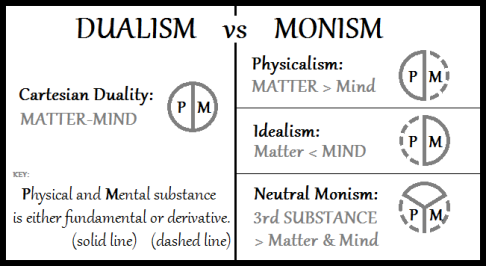In philosophy of mind, according to dictionary, 'dualism' is any of a narrow variety of views about the relationship between mind and matter, which claims that mind and matter are two ontologically separate categories. In particular, mind-body dualism claims that neither the mind nor matter can be reduced to each other in any way, and thus is opposed to materialism in general, and reductive materialism in particular. Mind-body dualism can exist as substance dualism which claims that the mind and the body are composed of a distinct substance, and as property dualism which claims that there may not be a distinction in substance, but that mental and physical properties are still categorically distinct, and not reducible to each other. This type of dualism is sometimes referred to as "mind and body" and stands in contrast to philosophical monism, which views mind and matter as being ultimately the same kind of thing. In the history of philosophy, Descartes is one of the representative modern 'dualist' philosophers.
In other words, 'mind-body dualism' became the basis of the modern thought and science. However, thanks to 'dualism', our body became to be regarded as 'lower' than mind by 'idealism'. At the same time, body is regarded more practical and utilizable by scientists, so our physical world had become more researched and developed under the name of physical science.
Western thoughts, especially, the subject, science cannot be explained without 'dualism', or the distinction of body and mind. As a result of dualism and the development of physical science, our mental and spiritual life has become less taken care of and even been regarded useless and non-practical. Although, idealism has a risk of being abstract and pointless, the extreme emphasis on physical science couldn't enrich our life mentally and spiritually.
However, in our real life, there is no distinction between mind and body; we only experience this world under many different situations themselves.
Western thoughts, especially, the subject, science cannot be explained without 'dualism', or the distinction of body and mind. As a result of dualism and the development of physical science, our mental and spiritual life has become less taken care of and even been regarded useless and non-practical. Although, idealism has a risk of being abstract and pointless, the extreme emphasis on physical science couldn't enrich our life mentally and spiritually.
However, in our real life, there is no distinction between mind and body; we only experience this world under many different situations themselves.
In the area of performance art, especially, our experience cannot be distinguished as into the two. Can you distinguish one performer's body and mind when the person is really absorbed in his or her performance?
This non-duality can be found the interaction between the performer and the audience. When the audience cheer and clap for the performer, do they really become aware of their body and mind separately?
This non-duality can be found the interaction between the performer and the audience. When the audience cheer and clap for the performer, do they really become aware of their body and mind separately?
This 'non-duality' happens exactly same as we experience all the different emotional and communicational incidents, especially when we meditate and practice on our mind as well as we pray for something.
'Non-dualism' is actually based on Advaita-Vedanta, which was one of the major Hindu philosophies and emphasized non-duality of Atman(self) and Brahman(god). As a result, Advaita-Vedanta is often regarded as an extreme metaphysical idealism. In my opinion, critics took the non-duality as a metaphysical status only, not the status of the yoga practitioners' achievement of the ultimate liberation. However the state of non-duality is just a metaphoric expression for the process toward the ultimate enlightenment, not a fixed mental status. In Buddhism, the negation of metaphysics became most highlighted and they negate any fixed entity of self.
In other words, duality is naturally made when we discriminate this and that as well as do better and worse. As a result, all the important moments of experiences cannot be achieved simply because of the distinction. Rather, we had better focus on the moments of our experience as Wittgenstein suggest in his 'picture theory': every picture or the moment is real as is seen as we cannot reject and deny our experience although it could be sometimes illusionary and temporary.
Thus, only after taking 'apoche' ('suspension of judgement' told by Husserl), at the moment of achieving 'non-duality', we would finally be able to understand and experience as it is. (Tathata).
Thanks for reading.

No comments:
Post a Comment